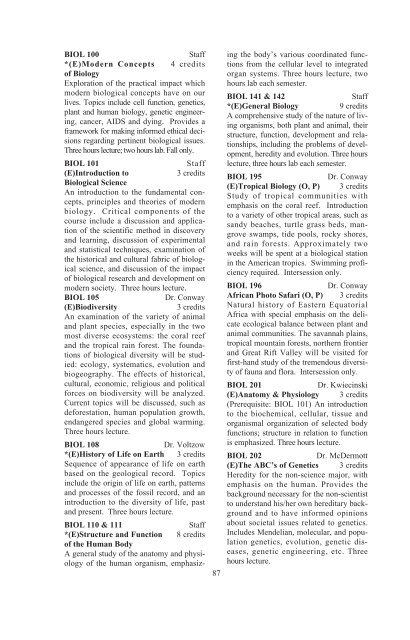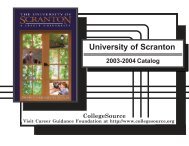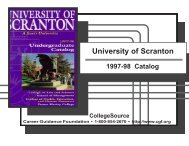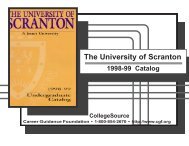2002-2003 - The University of Scranton
2002-2003 - The University of Scranton
2002-2003 - The University of Scranton
Create successful ePaper yourself
Turn your PDF publications into a flip-book with our unique Google optimized e-Paper software.
BIOL 100 Staff<br />
*(E)Modern Concepts 4 credits<br />
<strong>of</strong> Biology<br />
Exploration <strong>of</strong> the practical impact which<br />
modern biological concepts have on our<br />
lives. Topics include cell function, genetics,<br />
plant and human biology, genetic engineering,<br />
cancer, AIDS and dying. Provides a<br />
framework for making informed ethical decisions<br />
regarding pertinent biological issues.<br />
Three hours lecture; two hours lab. Fall only.<br />
BIOL 101 Staff<br />
(E)Introduction to 3 credits<br />
Biological Science<br />
An introduction to the fundamental concepts,<br />
principles and theories <strong>of</strong> modern<br />
biology. Critical components <strong>of</strong> the<br />
course include a discussion and application<br />
<strong>of</strong> the scientific method in discovery<br />
and learning, discussion <strong>of</strong> experimental<br />
and statistical techniques, examination <strong>of</strong><br />
the historical and cultural fabric <strong>of</strong> biological<br />
science, and discussion <strong>of</strong> the impact<br />
<strong>of</strong> biological research and development on<br />
modern society. Three hours lecture.<br />
BIOL 105 Dr. Conway<br />
(E)Biodiversity 3 credits<br />
An examination <strong>of</strong> the variety <strong>of</strong> animal<br />
and plant species, especially in the two<br />
most diverse ecosystems: the coral reef<br />
and the tropical rain forest. <strong>The</strong> foundations<br />
<strong>of</strong> biological diversity will be studied:<br />
ecology, systematics, evolution and<br />
biogeography. <strong>The</strong> effects <strong>of</strong> historical,<br />
cultural, economic, religious and political<br />
forces on biodiversity will be analyzed.<br />
Current topics will be discussed, such as<br />
deforestation, human population growth,<br />
endangered species and global warming.<br />
Three hours lecture.<br />
BIOL 108 Dr. Voltzow<br />
*(E)History <strong>of</strong> Life on Earth 3 credits<br />
Sequence <strong>of</strong> appearance <strong>of</strong> life on earth<br />
based on the geological record. Topics<br />
include the origin <strong>of</strong> life on earth, patterns<br />
and processes <strong>of</strong> the fossil record, and an<br />
introduction to the diversity <strong>of</strong> life, past<br />
and present. Three hours lecture.<br />
BIOL 110 & 111 Staff<br />
*(E)Structure and Function 8 credits<br />
<strong>of</strong> the Human Body<br />
A general study <strong>of</strong> the anatomy and physiology<br />
<strong>of</strong> the human organism, emphasiz-<br />
87<br />
ing the body’s various coordinated functions<br />
from the cellular level to integrated<br />
organ systems. Three hours lecture, two<br />
hours lab each semester.<br />
BIOL 141 & 142 Staff<br />
*(E)General Biology 9 credits<br />
A comprehensive study <strong>of</strong> the nature <strong>of</strong> living<br />
organisms, both plant and animal, their<br />
structure, function, development and relationships,<br />
including the problems <strong>of</strong> development,<br />
heredity and evolution. Three hours<br />
lecture, three hours lab each semester.<br />
BIOL 195 Dr. Conway<br />
(E)Tropical Biology (O, P) 3 credits<br />
Study <strong>of</strong> tropical communities with<br />
emphasis on the coral reef. Introduction<br />
to a variety <strong>of</strong> other tropical areas, such as<br />
sandy beaches, turtle grass beds, mangrove<br />
swamps, tide pools, rocky shores,<br />
and rain forests. Approximately two<br />
weeks will be spent at a biological station<br />
in the American tropics. Swimming pr<strong>of</strong>iciency<br />
required. Intersession only.<br />
BIOL 196 Dr. Conway<br />
African Photo Safari (O, P) 3 credits<br />
Natural history <strong>of</strong> Eastern Equatorial<br />
Africa with special emphasis on the delicate<br />
ecological balance between plant and<br />
animal communities. <strong>The</strong> savannah plains,<br />
tropical mountain forests, northern frontier<br />
and Great Rift Valley will be visited for<br />
first-hand study <strong>of</strong> the tremendous diversity<br />
<strong>of</strong> fauna and flora. Intersession only.<br />
BIOL 201 Dr. Kwiecinski<br />
(E)Anatomy & Physiology 3 credits<br />
(Prerequisite: BIOL 101) An introduction<br />
to the biochemical, cellular, tissue and<br />
organismal organization <strong>of</strong> selected body<br />
functions; structure in relation to function<br />
is emphasized. Three hours lecture.<br />
BIOL 202 Dr. McDermott<br />
(E)<strong>The</strong> ABC’s <strong>of</strong> Genetics 3 credits<br />
Heredity for the non-science major, with<br />
emphasis on the human. Provides the<br />
background necessary for the non-scientist<br />
to understand his/her own hereditary background<br />
and to have informed opinions<br />
about societal issues related to genetics.<br />
Includes Mendelian, molecular, and population<br />
genetics, evolution, genetic diseases,<br />
genetic engineering, etc. Three<br />
hours lecture.
















